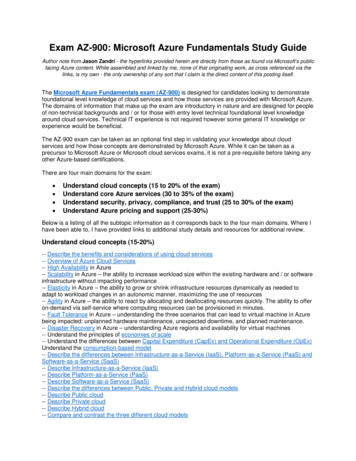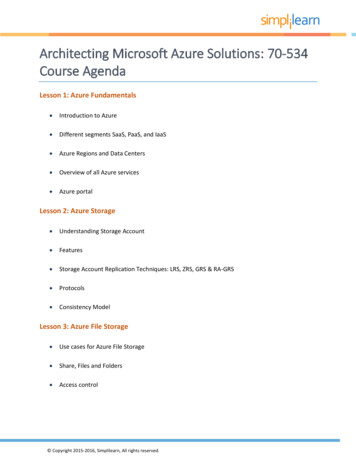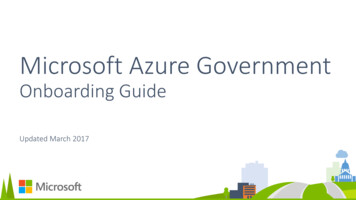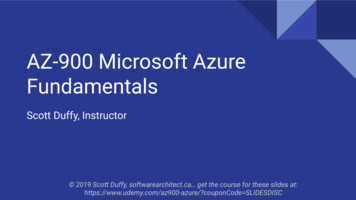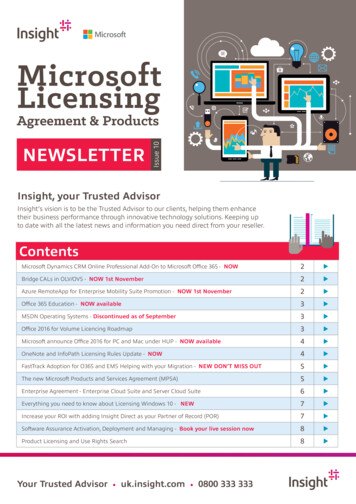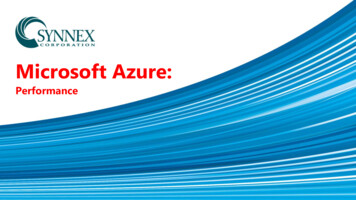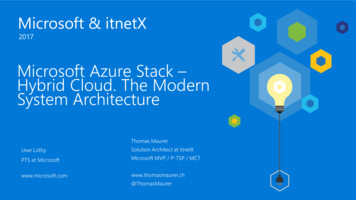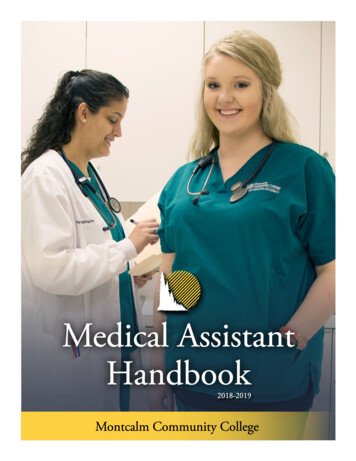
Transcription
Medical AssistantHandbook2018-2019Montcalm Community College
TABLE OF CONTENTSWelcome .2People To Know .3Brief Statement About Accreditation .3Philosophy, Goals and Objectives .4Statement of Philosophy .5Harassment Policy .6Non-Discrimination Policy.6Confidentiality .6Rights and Responsibilities .7Admission Requirements.8Scholastic Requirements .10Program Performance Standards .11Academic Integrity .12Progression Requirements .12Dress Code Guidelines .13Health Requirements .14Latex Allergy Information .16American Association of Medical Assistants .17Graduation Information .18Certification Exam/Felony Disclosure .19Externship/practicum.19Exhibit A – Health Status Acknowledgement .22Exhibit B – Student Externship/practicum Agreement .23Exhibit C – Statement of Acceptance of Latex Information .24Exhibit D – Waiver, Release, and Discharge of Liability: Latex Exposure .25APPENDICES .26APPENDIX A – Medical Assistant Program Schedule . .27APPENDIX B – Course Descriptions for Medical Assistant Students .28
Welcome to Montcalm Community College'sMedical Assistant ProgramWelcome to the Medical Assistant Program – specifically Montcalm Community College's(MCC) Medical Assistant Program. We are pleased that you have chosen MCC for your medicalassistant education.The need for medical assistants began when doctors found demands on their time multiplying.As demands increased, specialized health professionals were needed to help meet these demands.By 1955, standards for educational programs were a must; therefore, the American Association ofMedical Assistants was founded to standardize educational programs and offer accreditation tothose meeting specific criteria. In 1978, the United States Department of Health, Education andWelfare formally recognized the Medical Assistant as a distinct allied health profession.Medical Assisting (MA) is an allied health profession whose practitioners function as members ofthe health care delivery team and perform administrative and clinical procedures according to thedefinition printed in the Standards and Guidelines for an Accredited Educational Program forMedical Assistants. Administrative duties performed by medical assistants include answeringtelephones, making appointments, greeting patients, filing medical records, processing insuranceforms, writing correspondence, arranging for hospital admission and laboratory services, andperforming billing and bookkeeping tasks. Clinical duties include checking blood pressures,answering questions about health concerns, sterilizing supplies and equipment, giving injections,drawing blood, taking electrocardiograms, collecting specimens, and performing basic laboratorytests. Medical assistant duties vary from job to job and specialty to specialty. MAs are truly at theheart of the medical practice and are the most versatile member of the team.In the field of medical assisting you will always be surrounded by challenges and carry immenseresponsibility. You will never cease to be amazed at your patients' capacity for love, courage, andendurance. You will step into patients' lives and make a difference. You have chosen this fieldbecause you have more of an interest in your work than just making a living.Many rules and regulations are set forth by the medical assisting credentialing body, the medicalassistant program director, faculty, and Dean of Nursing & Health Careers at MontcalmCommunity College to assist you in demonstrating appropriate professional behavior. Many ofthe policies, rules, and regulations may seem stringent however; there is good reason for all ofthem. Health care is provided in a community of values, culture, and customs; therefore, many ofthe rules are put in place with an understanding of the communities where you will be practicing.You have enormous responsibilities in this field. It is an expectation that you will consult thishandbook frequently throughout the year to find answers to your questions.Amy Eady, MT(ASCP), MS, RMAMedical Assistant Program Director2
PEOPLE TO KNOWPresident . Robert Ferrintino, JDVice President for Academic Affairs . Rob SpohrMedical Assistant Program Director . Amy Eady, BS, MT (ASCP), MS, RMAPracticum Coordinator . Amy Eady, BS, MT (ASCP), MS, RMADean of Nursing & Health Careers . Danielle Anderson, MSNDean of Occupations & Program Assessment . Amy Eady, BS, MT (ASCP), MS, RMADean of Student & Enrollment Services . Debbi AlexanderAdministrative Assistant for Nursing & Health Careers . Heather MillerStudent Success Center (tutoring) .ext. 264NOTE TO STUDENTS!!The provisions of this handbook are not to be regarded as an irrevocable contract betweenthe student and the College. The College reserves the right to make and designate theeffective date of changes in college policies and other regulations at any time suchchanges are considered to be desirable or necessary.A BRIEF STATEMENT ABOUT ACCREDITATIONInstitutional AccreditationMontcalm Community College has enjoyed a long history of accreditation by the HigherLearning Commission and is a member of the North Central Association This means theCollege is an accredited institution.Programmatic AccreditationMontcalm Community College is accredited by the Commission on Accreditation ofAllied Health Education Programs (www.caahep.org) upon the recommendation of theMedical Assisting Education Review Board (MAERB).Commission on Accreditation of Allied Health Education Programs25400 US Highway 19 NorthSuite 158Clearwater, FL 33763727-210-2350mail@caahep.orgwww.caahep.org3
PHILOSOPHY, GOALS, AND OBJECTIVESMontcalm Community College's Mission and GoalsThe Medical Assistant Program administrative personnel and faculty support the missionand goal statements of Montcalm Community College as stated in the College catalog.Objectives of the Medical Assistant ProgramThe College’s goal is to prepare competent entry-level medical assistants in the cognitive(knowledge), psychomotor (skills), and affective (behavior) learning domains. TheCollege will provide students with a curriculum of general and technical courses thatmeet the requirements for granting a certificate in medical assisting and meet theStandards of an accredited program.Upon completion of the program the student will be able to:a.Demonstrate the knowledge and skill necessary to perform medical assistingduties at an entry-level standard as identified by the healthcare community.b.Demonstrate mastery of the entry-level competencies of the medical assistant asidentified in the 2015 Standards and Guidelines for an Accredited EducationalProgram for the Medical Assistant.c.Demonstrate personal and ethical behaviors consistent with the expectations ofthe profession and the employer.d.Apply to write and successfully pass the national certification exam (CMA)administered by the American Association of Medical Assistants after obtainingAAMA accreditation.4
STATEMENT OF PHILOSOPHYSociety and the Health of Society: Montcalm Community College Medical Assistantfaculty believe that every individual seeking and/or in need of health care deserves safe,respectful care. Health is defined as body, mind, and spirit in balance. Society'sexpectations of health care are on a continuum of sophisticated life-saving technologieswith participation in decision making at one end of the spectrum to readily availablewellness programs at the other end.The Medical Assistant in Society: The Medical Assistant is a multi-skilled allied healthprofessional who primarily works in ambulatory settings. Medical Assistants function asmembers of the health care team who perform administrative and clinical procedures. Inaddition, the Medical Assistant must demonstrate competence by the display ofprofessionalism, communicating effectively, practicing within the ethical and legalstandards of the profession, and providing appropriate client education. MedicalAssistants practice under the supervision of a licensed health care provider.Characteristics of Students: Medical Assistant students typically seek this professionbecause of its service orientation. This desire to help others must lead to thedemonstration of professional behaviors of accepting responsibility for one's own actions,performing within the scope of education, and complying within the ethical and legalstandards of the profession.Teaching and Learning: The faculty of the Medical Assistant program believes thatlearning is an individual process and that teaching is intended to facilitate that process.The faculty believes that learning occurs in a variety of ways, from simple to complex,and that educational experiences can be designed to build on the learner's previousknowledge and skills.The faculty believes learning is easier for the motivated student and is a self-directingprocess. Further, the faculty believes that student progress can be enhanced when arelationship of trust is established between student and instructor.The faculty uses a variety of teaching strategies to facilitate learning and to developstudent responsibility for the acquisition of skills and knowledge. The faculty clarifiesgoals and plans experiences to enhance student progression toward goal attainment. Theteaching strategies used allow for adaptation to meet individual student needs.Evaluation of performance is an integral part of the learning process. Each learner isexpected to meet specified levels of performance as he/she goes through the curriculum.The faculty endorses the credentialing process offered by the American Association ofMedical Assistants (AAMA) as a means of documenting competence of the MedicalAssistant as a practitioner prepared to provide safe and respectful health care.5
STUDENT CODE OF CONDUCTIn addition to policies outlined in this handbook, the student must abide by the policiesincluded in the MCC catalog.HARASSMENT POLICYFaculty, students, and patients have the right to be treated with respect and dignity.Abusing the dignity of anyone through ethnic, sexist, or racial slurs, or discriminatingagainst anyone because of race, color, religion, sex, marital status, height, weight,national origin or ancestry, or war veteran status is illegal and will not be tolerated.Students who feel they are the objects of such conduct should report the behavior to theDean of Student Services who will review the complaint and take appropriate action.Students may request a review of a decision of the Dean of Student Services utilizing theprocedure outlined in "Provisions for Review of Disciplinary Decisions" in the MCCcatalog.NON-DISCRIMINATION POLICYAll patients/clients deserve dignity and respect and are to be treated equally,compassionately, and professionally regardless of their illness, injury, race, beliefs, socialstatus, etc. Should a student be deemed to have abused, discriminated against, orotherwise failed to respect the right and dignities of a patient, that student will be subjectto disciplinary action up to and including dismissal from the Medical Assistant Program.CONFIDENTIALITYStudents are expected to respect the rights of patients/clients at all times, to treat clientsconsistent with the standard of care and the education they have been provided, to neverrelease information about clients to anyone outside of the immediate health care teamcurrently caring for that patient/client. The student may also need to complete additionalpatient confidentiality training during their clinical experiences. All information gainedfor and about patients/clients at clinical sites is confidential. A student's failure to adhereto this standard of confidentiality will result in disciplinary action up to and includingdismissal from the Medical Assistant Program and the inability to enroll in any programat MCC that requires patient confidentiality training.Any written work prepared by students as part of clinical assignments must refer topatients/clients as designated by the clinical sites guidelines. The reference must not betraceable back to the patient/client.6
RIGHTS AND RESPONSIBILITIESBoth faculty and medical assisting students have the right to be treated with respect andthe right to be human.FACULTY RIGHTS AND RESPONSIBILITESThe medical assisting faculty, with approval of the MA Program Director and the Deanof Nursing & Health Careers, has the right to suspend, place on probation, or dismiss amedical assisting student from the program who exhibits unsafe practice, inappropriatebehavior or substandard patient care in the clinical/laboratory area.The faculty has the right to participate in policy development dealing with studentconcerns and/or the academic program.The faculty has the responsibility to remain current in their subject area and in teachingmethods.STUDENT RIGHTS AND RESPONSIBILITIESMedical assisting students have a right to quality education, review of formativeevaluation and due process.Medical assisting students have the right to fair evaluations of their performance.Medical assisting students have the right to confidentiality of information concerninggrades and performance.Medical assisting students have the right to participate in course, faculty, program, andexternship/practicum/practicum evaluations.Medical assisting students have the right to appeal a dismissal from the medical assistantprogram. See MCC catalog for policy and procedure.These rights are yours, as a medical assistant student, but acquiring and holding them isyour responsibility.7
ADMISSION REQUIREMENTSAdmission to the CollegeApplicants for admission to the College must possess a high school diploma, GEDcertificate or meet requirements of the college's ability-to-benefit policy as stated in theCollege catalog.Admission to the ProgramApplicants must also meet requirements for admission to the program. Reference thefollowing website for specific information regarding options for determining appropriatetesting options: https://www.montcalm.edu/accuplacer. The following levels on testingare required to be successful in the program:ReadingWritingNumericalLevels332Criminal History CheckOn May 10, 2002, the State of Michigan approved House Bill #4057, which requiresCriminal Background Checks for anyone applying for employment or clinical privilegesin a Nursing Home, Hospital Long-Term Care Unit, County Medical Care Facility, orHome for the Aged. On April 1, 2006, additional rules were put into place requiring indepth criminal background checks and fingerprints on all new employees or personsbeing granted clinical privileges. If you have further questions about Michigan PublicActs 27, 28 and 29 of 2006, please contact MCCs Dean of Occupations and ProgramAssessment.All students who participate in any health careers course/program with a clinicalcomponent must have a clear criminal background to progress through the program. TheClinical Student Disclosure Statement allows a student an opportunity to disclose anyconvictions on their criminal record before MCC receives the report. Any false,misleading, or omission of charges on this form will result in removal from the programand courses. Criminal Background Checks (CBC), through a search, will be requiredseveral times during the progression of the program at the student’s expense.The Administrative Assistant for Nursing & Health Careers or their designee, willprovide information regarding the process and deadlines prior to the start of eachsemester, when appropriate.Health Requirements:1.Documentation of immunizations must be received by the Health Careers Officeas part of AHEA109-Foundations of Medical Assisting through the designatedmethod. These must be submitted prior to scheduling the shadow exercise. Oncesubmitted, all immunizations must be kept up-to-date for the student to participatein the lab and clinical components of medical assistant program.8
2.A physical exam is required and is done at the student's expense prior toparticipating in the AHEA112-Medical Laboratory Procedures course. Proof ofthe physical exam, flu vaccination, maintenance of other vaccinations, and acurrent TB test must be received by the Health Careers Office prior toparticipating in AHEA 112.3.Students must successfully pass AHEA 100 and/or have a valid American HeartAssociation Basic Life Support CPR card and First Aid card prior participating inthe externship/practicum course.4.Students are required to wear a uniform that presents a professional appearancefor the job shadow experience, clinical, laboratory, and externship/practicumcourses. See Dress Code Requirements (pg.13) for details.5.Professional liability insurance is required of all medical assisting students. Agroup policy is available through MCC at registration. The student will incur thiscost at registration for courses that necessitate it.6.Students will have their own watch with a second hand, stethoscope, andsphygmomanometer for clinical (AHEA 111) and externship/practicum courses(AHEA126). These items are required purchases from the bookstore for specificcourses prior to the externship/practicum.7.Students are required to have their own transportation to externship/practicumsites. Required externship/practicum hours are 160 to be completed within thespecified criteria set forth by the Program Director or designee. These hours are inaddition to 16 hours of classroom time. The College will attempt to keep distancesto be traveled as reasonable as possible. The College does not guarantee specificexternship/practicum sites.8.Clinical sites may require the completion of an interview prior to acceptingstudents for the externship/practicum experience and once accepted, a sitespecific orientation session. These hours are not counted towards the 160 hours ofexternship/practicum time. In addition, some clinical sites require the completionof another background check and drug screen. These costs are covered by theclinical site.9.Students who have a serious illness, injury, pregnancy or a protected disabilitywhile in the program may be required to obtain a written release from a healthcare provider verifying that they are able to meet class, laboratory, and /or clinicalpractice requirements without jeopardizing the safety and well-being of patients,other students, instructors, staff, the public or themselves. This written releasewill be retained in the student’s file. Reasonable accommodations will be made,when possible, for protected conditions. Notice of the disabling condition and therequested accommodation should be made to the Medical Assistant ProgramDirector. Modifications to the program will not be made where it would alter thebasic nature of the program, jeopardize program accreditation or the safety orwell-being of those exposed to the student through the medical assistant program.9
Failure to provide the written release as requested may result in temporary orpermanent suspension from the program.10.Additionally, students who are ill and the instructor believes that theirparticipation in the class or clinical setting may be detrimental to either thestudent or client, the student may, at the instructor’s discretion, be sent homeand/or required to bring a medical validation of fitness to participate in anyfurther activities.SCHOLASTIC REQUIREMENTSTo pass each medical assisting course a student must achieve an average of 78 percent or higheron the tests and the comprehensive final exam and 85 percent or higher on the entry-levelcompetencies. It is important to note that both requirements must be met, the 78% for theory andthe 85% for performance.The following grading scale has been adopted for all medical assisting courses:GRADING SCALE100-95 4.0 A94-90 3.7 A89-86 3.3 B 85-83 3.0 B82-80 2.7 B79-78 2.3 C 77-74 2.0 C73-70 1.7 C69-66 1.0 D 65-63 0.7 D62-60 0.0 D59 and below EThe grading criteria for competencies are outlined within each core medical assistant class.Each competency starts with 100 points. If any step in the procedure is missed, then the assignedvalue is subtracted from 100 points. The student must achieve a passing score of 85% to pass thecompetency in one out of two attempts or as otherwise outlined in that competency pack.There is a 15-point deduction for absence on check off day and any repeat attempts to achieve the85% accuracy. A score of 85% or better must be achieved, and then 15 points is deducted fromthe actual score. This penalty is to encourage you to make your first attempt your best attemptand not to miss class on check-off day. It is important to practice each skill prior to check off.10
REQUIRED PROGRAM PERFORMANCE STANDARDS FOR ADMISSIONAND PROGRESSIONHealth career students are required to reach a minimum level of competency according toaccrediting bodies and healthcare institutions. Failure to meet the criteria below mayresult in denial of admission or progression within the selected program of study. If, afteradmission, it is discovered that the student cannot meet the below mentioned criteria, thestudent will be required to leave the program. Those individuals who have a documenteddisability must follow the guidelines outlined in the catalog.I.CRITICAL THINKINGA. Critical thinking ability sufficient for clinical judgment and problem solving.B. I am able to identify cause-effect relationships in clinical situations and understand care plans. yes noII.INTERPERSONALA. Interpersonal abilities sufficient to interact with individuals, families, and groups from a varietyof social, emotional, cultural and intellectual backgrounds.B. I am able to establish rapport with patients/clients and colleagues. Exhibit a professionalappearance and attitude. Treat each person with dignity and respect. yes noIII. MENTAL STABILITYA. Non-disruptive, positive attitude with a mental capacity to function effectively under stress.B. I have the ability to control my behavior in the classroom, laboratory, and clinical setting. yes noIV. MOBILITYA. Physical abilities sufficient to move from room to room and maneuver in small spaces.B. I have the ability to move around in patient rooms, work spaces, treatment areas, lift, transfer,squat, pull/push, sit and stand without any restrictions. yes noV.MOTOR SKILLSA. Gross and fine motor abilities sufficient to provide safe and effective nursing care.B. I am able to calibrate and use equipment, position patients and draw up a solution in a syringe. yes noVI. HEARINGA. Ability to hear sufficiently to monitor and assess health needs.B. I am able to hear monitor alarms, emergency signals, sounds heard through a stethoscope,and patient’s verbal requests. yes noVII. VISUALA. Visual ability sufficient for observation and inspection necessary in health care.B. I am visually able to observe patient/client responses, with the ability to read measurementsand fine print material. yes noVIII. TACTILEA. Tactile/touch ability sufficient for physical inspection.B. I am able to perform palpation/touch to determine swelling, temperature, bumps and lumps,etc This will contribute to performing and reporting physical findings. yes no11
ACADEMIC INTEGRITYWe expect students to uphold the highest standards of academic integrity during their time withus in Montcalm Community College's Medical Assistant Program. Cheating and plagiarism aretwo of the most obvious violations of academic honesty.Standards of integrity expected: Honest representation of required coursework Attendance at required learning activities Responsibility and accountability for individual judgments and actions Act to safeguard the client and the public when health care and safety areaffected by the incompetent, unethical, or illegal practice of another student.Forms of plagiarism: Submitting a paper, homework or assignment which was either wholly orpartially written by someone else even with proper citation(s). Using direct quotations which are not enclosed in quotation marks (or indentedform for long quotations). This includes portions of sentences as well as fullsentences. Material that is clearly a paraphrase of one source but which is not documented. Presentation of undocumented information that is clearly not “commonknowledge" in the area being considered in the paper. Cheating on any examPenalties: All students are expected to be honest in their studies. Dishonesty in completingassignments, examinations, or other academic endeavors is considered anextremely serious violation of the rights of others at MCC.Students in violation of academic integrity will be issued a failing grade (E),dismissed from the program and referred to the Dean of Student & EnrollmentServices.PROGRESSION IN THE PROGRAMStudents can progress through the program without interruption if a C (78%) or better ismaintained in all medical assisting courses (AHEA 109, 111, 112, 113, 114, 115 and 126). Eachof the medical assisting courses can be repeated only once. An attempt is counted if the studenthas a course grade of less than a C in a class or withdraws. Students must speak with an MCCcounselor and the program director (or their designee), before repeating any medical assistantcourse. A re-entry contract is required for all students repeating courses to outline a plan tofacilitate the student’s success. Students must maintain an overall GPA of 2.0 or higher in orderto obtain a certificate in medical assisting and graduate from the College. Externship/practicumrequirements are outlined under Externship/practicum.All medical assisting courses must be completed within one to two years to facilitate the student’ssuccess in the externship/practicum setting and the national certification examination. Theinstructors have determined the following as critical areas and students should be mindful of thetime frames. If the time limit has been exceeded (one year for AHEA111, AHEA112 andAHEA115; two years for AHEA100, AHEA109, AHEA113 and AHEA114), a mandatoryvalidation of knowledge and skills is necessary prior to applying for the externship/practicum(AHEA126). Contact the program director (or their designee) to make the necessaryarrangements.12
DRESS CODE GUIDELINESThe following dress code has been developed for the medical assisting students. Yourepresent yourself, the College, and the profession. We all want your impression to be agood one.1.2.3.4.5.6.7.8.9.10.11.Students are expected to wear dark green scrub pants or skirt with a dark greenscrub top purchased through the bookstore on campus.Clothes must be clean, pressed, fit properly, and be of appropriate length forprofessional attire. Undergarments should not be visible through the scrubs or labcoat. The program director (or designee) will be the final authority regardingdress code issues.Shoes should be clean with a solid upper. The color may be white, black, orbrown. Minimal accent color may be permitted at discretion of the MA ProgramDirector, or their designee. Shoes must be enclosed with no open heels or opentoes. Shoes may have no holes greater than 1/8 inch. The foot must be enclosedfrom toe to heel. Shoes and laces must be clean. Socks and hose are to
Medical Assistants. Administrative duties performed by medical assistants include answering telephones, making appointments, greeting patients, filing medical records, processing insurance forms, writing correspondence, arranging for hospital admission and laboratory se
